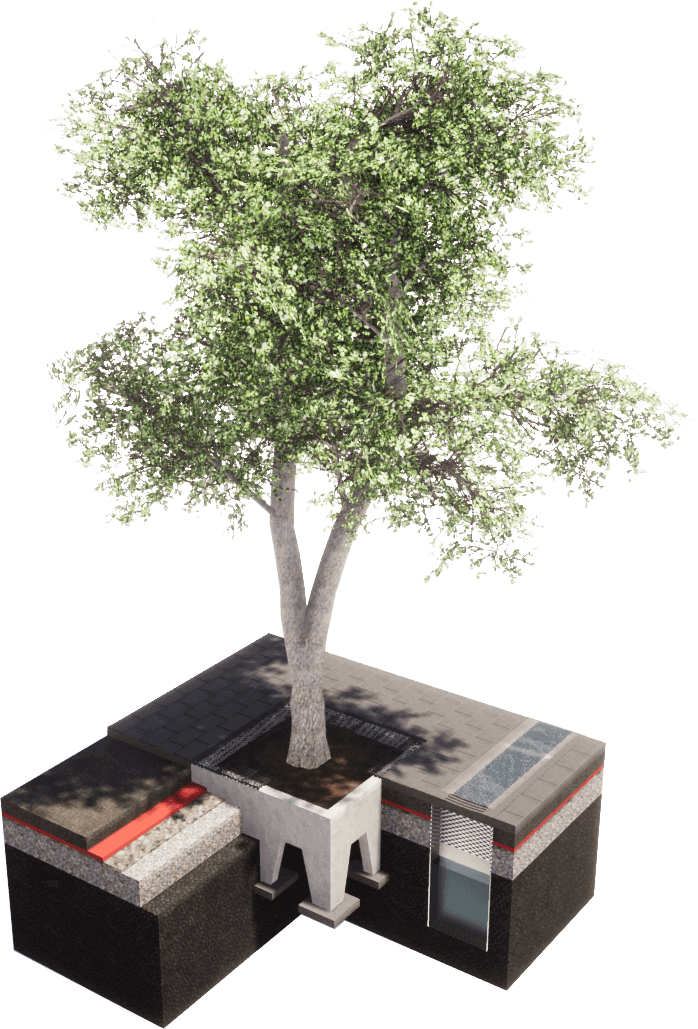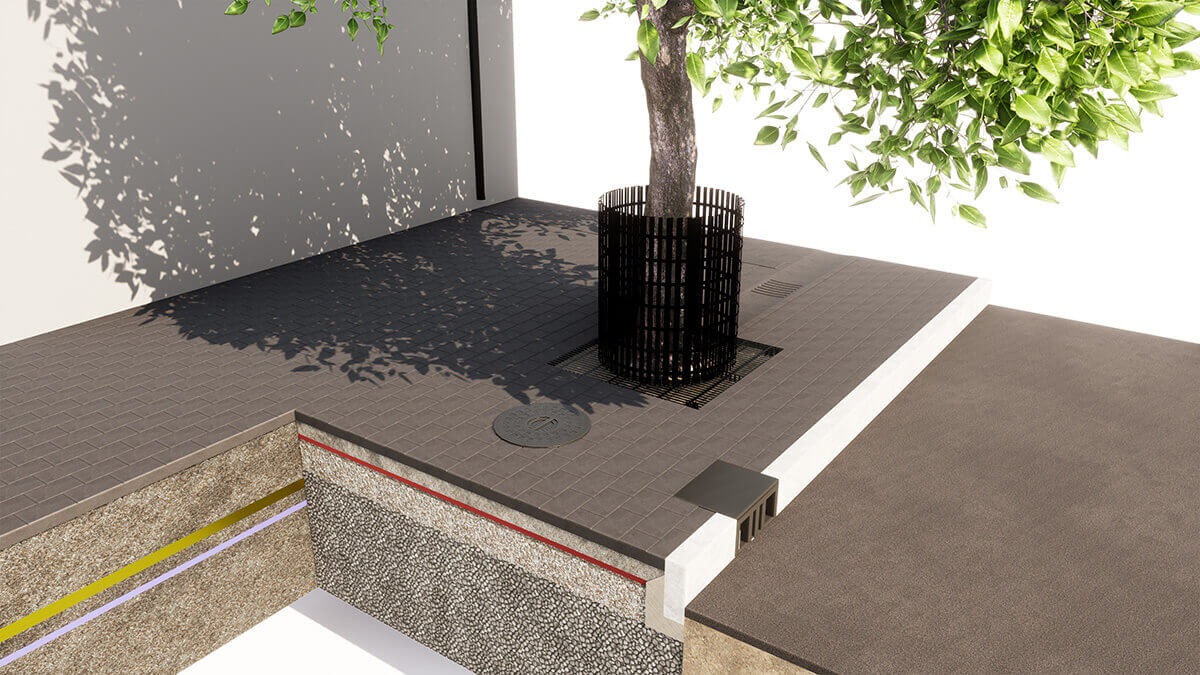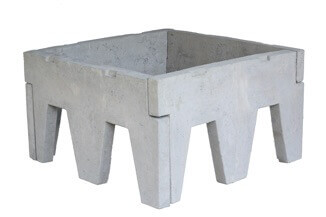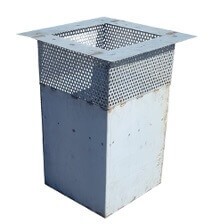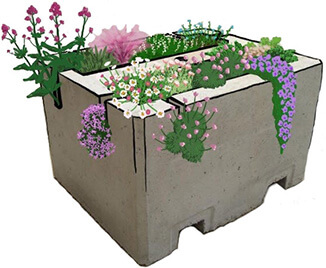Healthier trees,
healthier cities
It’s common to see urban trees in poor health, and trees planted in hard landscaping often die young. There may be a variety of reasons for this but in most cases it’s because they don’t have access to enough rootable soil or they don’t receive enough water. If urban trees fail to reach maturity they only provide a small fraction of the benefits that they could potentially be bringing to towns and cities.
The Stockholm system offers a practical and effective solution for planting trees in hard landscaped areas. We supply the equipment and know-how to landscape architects, engineers, and construction companies throughout the UK.
How it works
A structural soil is a stone-based growing medium that can support pedestrian and vehicular traffic, and so their use allows tree pits to be extended beneath hard surfacing. This enables designers to provide enough soil for a tree to be healthy and reach maturity. When designing tree pits with structural soils rainwater that has been collected from roofs, roads and paved surfaces is diverted into the tree pit. This is good for the trees and tree pits constructed using this approach also contribute to sustainable drainage systems (SuDS).
The tree planting programme carried out by the City of Stockholm has demonstrated that exceptionally healthy trees can be cultivated when using structural soils. This website aims to explain how tree pits can be successfully designed with structural soils.
Standard machinery found on most building sites can be used to install structural soils which means that they are easy to use. Also, the simple design allows structural soils to be dug up after the pavement has been laid if any future ground works are required.
Download the guide that explains the principles of designing of tree pits using structural soils.
Click on the numbers to find out more about each design feature.
Fundamentals of tree pit design
To get the best long-term benefits from urban trees we need to be designing tree pits that allow them to reach the mature phase of their life cycle where they will survive for many years with little requirement for maintenance.
Trees can be an important part of a sustainable drainage system. They draw large amounts of water up through the soil, and their leaves catch and slow down water before it reaches the ground. Tree roots can also absorb pollutants from soil and soil-water. Therefore, it’s important that tree pits are integrated with the overall site drainage design.
There are three key aspects of a successful tree pit design:
Soil volume
Designers need to specify enough soil to support the tree at its mature size, download our detailed guidance on soil volumes for different sized species.
Water
Trees need a continual supply of water if they are to thrive. In the urban environment a tree’s water supply can be naturally sustained if rainwater is collected and diverted into the tree pit.
Air
Roots and soil organisms respire in order to generate energy which is a process that requires oxygen. Therefore, pathways need to be provided for gaseous exchange between the soil and the above ground atmosphere.
Modular plastic structures (crate systems) or structural soils can be used to support surfacing above tree pits. Both systems can support healthy urban trees, but tree pits made using crate systems are much more expensive than tree pits constructed with structural soils.
Recommended volumes for tree pits
People have been building tree pits for over a century and deciding how big to build them has always been a trade-off between how much space the tree needs and how much can be afforded in the design. The most limiting factor in the growth of urban trees is the lack of usable soil for root growth, and inadequate underground rooting space is one of the main contributors to the premature mortality of urban trees.
There is a direct relationship between the volume of below ground growing space and how a tree is likely to develop, the greater the soil volume:
- the faster the tree will grow
- the bigger it will become
- the healthier it will be
- the better it will look
- the longer it can be expected to live
Therefore, when designing urban spaces, we need to make sure that the species that we wish to plant is provided with enough soil to be healthy and reach a degree of maturity that will deliver benefits to the local community. The minimum volume of soil recommended for trees of different sizes is provided in Table 1.
Table 1: Minimum requirements for tree pit specifications.
| Mature size of tree*† | |||||
|---|---|---|---|---|---|
| Very small (<5m) |
Small (5 - 10m) |
Medium (10 - 15m) |
Large (15 - 25m) |
Massive (>25m) |
|
| Recommended minimum volume of uncompacted loam soil | 6m³ (5m³ if shared) |
12m³ (9.5m³ if shared) |
20m³ (16m³ if shared) |
28m³ (24m³ if shared) |
36m³ (30m³ if shared) |
| Recommended minimum volume of stone-based structural soil | 8m³ (6m³ if shared) |
15m³ (12m³ if shared) |
26m³ (20m³ if shared) |
36m³ (28m³ if shared) |
45m³ (35m³ if shared) |
| Recommended number of air/water inlets‡ | 1 (0.5 if shared) |
1 (0.5 if shared) |
1 | 2 (1.5 if shared) |
2 |
*Mature tree sizes are listed in Tree Species Selection for Green Infrastructure - a guide for specifiers.
†Fastigiate trees will require less rooting space than trees with wide canopy shapes. As a rule of thumb, one should assume that a tree with a narrow and columnar crown form would require half as much soil volume as a tree of the same height that has a wide crown.
‡Ideally the surface of the tree pit should be open, rough in texture, and protected from compaction. If there is hard surfacing above the tree pit designers must provide pathways for water ingress and gaseous exchange. This could be provided by a permeable surface over the whole of the tree pit or by using a non-permeable surface with specially designed inlets. Suitable inlets would be substantially larger than an irrigation tube and service the whole of the tree pit.
Download our guide to soil volumes for tree pits designed with structural soils.
Products
Stockholm Tree Pits supplies four products:
Stockholm Tree Pits can now supply Carbon Gold Tree Soil Improver biochar in bulk and at a discounted rate. This is a enriched biochar that improves soil structure and is proven to boost the health and vitality of trees. We are pleased to add this product to our range because it is a key component of structural soils.
Please get in contact if you would like a quote for your project.
Consultancy services
Stockholm Tree Pits specialises in the design of urban tree pits and offer this as a consultancy service. We can assist in all stages of a project, from initial masterplanning through to detailed design and the supervision of tree pit installations.
Get in contact if you have any questions about how to design or construct tree pits using structural soils and we will work with our team to provide you with detailed answers.
Stockholm Tree Pits is an offshoot of Bosky Trees arboricultural consultancy. As a professional consultancy business, we regularly collaborate with landscape architects when designing new development schemes. We also use our practical experience to assist contractors when they are working near established trees.
Above all we try to manage trees in the best way possible for the health of people and the natural environment.
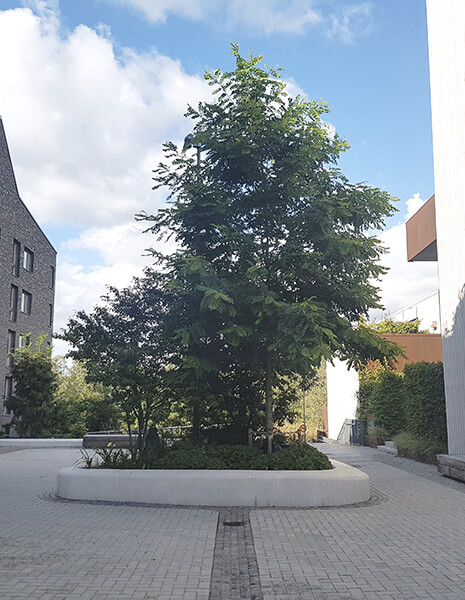
Technical downloads
Diagrams are available to help designers specify structural soils, these can be downloaded in DWG or PDF formats.
Download diagrams individually below, or download all our resources.
- Tree pits installation guide Illustrated step-by-step guide to tree pit installation
- Structural soil tree pits section drawing Diagram showing tree pit design using structural soils
- Kerb inlet section drawing Diagram showing kerb inlet design for a submerged tree pit
- Concrete planting frame (1.2m x 1.2m) Diagram showing dimensions of planting frame (1.2m x 1.2m)
- Concrete planting frame (1m x 1m) Diagram showing dimensions of planting frame (1m x 1m)
- Aeration well specification Diagram showing dimensions of aeration well
- Materials calculator Tree pit materials calculator
- Recommended reading List of recommended reading
Get in touch
We are here to help, please get in contact if you have any questions about tree pit designs or if you would like a quote for any of our products or services.
If you are interested in purchasing our products and would like to speak to someone in our sales team, please call us on 07872 609 633. Alternatively send us an email using the form below.


